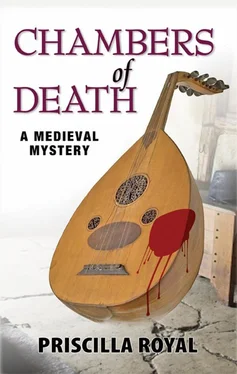Priscilla Royal - Chambers of Death
Здесь есть возможность читать онлайн «Priscilla Royal - Chambers of Death» весь текст электронной книги совершенно бесплатно (целиком полную версию без сокращений). В некоторых случаях можно слушать аудио, скачать через торрент в формате fb2 и присутствует краткое содержание. Год выпуска: 2011, ISBN: 2011, Издательство: Poisoned Pen Press, Жанр: Исторический детектив, на английском языке. Описание произведения, (предисловие) а так же отзывы посетителей доступны на портале библиотеки ЛибКат.
- Название:Chambers of Death
- Автор:
- Издательство:Poisoned Pen Press
- Жанр:
- Год:2011
- ISBN:9781615951796
- Рейтинг книги:4 / 5. Голосов: 1
-
Избранное:Добавить в избранное
- Отзывы:
-
Ваша оценка:
- 80
- 1
- 2
- 3
- 4
- 5
Chambers of Death: краткое содержание, описание и аннотация
Предлагаем к чтению аннотацию, описание, краткое содержание или предисловие (зависит от того, что написал сам автор книги «Chambers of Death»). Если вы не нашли необходимую информацию о книге — напишите в комментариях, мы постараемся отыскать её.
Chambers of Death — читать онлайн бесплатно полную книгу (весь текст) целиком
Ниже представлен текст книги, разбитый по страницам. Система сохранения места последней прочитанной страницы, позволяет с удобством читать онлайн бесплатно книгу «Chambers of Death», без необходимости каждый раз заново искать на чём Вы остановились. Поставьте закладку, и сможете в любой момент перейти на страницу, на которой закончили чтение.
Интервал:
Закладка:
Eleanor pressed her fist against the stone. “My primary responsibility is for the safety of those who came with me, a journey that grows even more ill-advised each day that I insist on meddling in affairs that are not mine to resolve,” she muttered. “And shall I repay the kindness of hospitality by pointing an accusing finger at those same good souls just because their motivations in killing this groom have not been questioned? What arrogance to think that I know better than those who have far greater understanding of the ways of this place! Since when has ignorance proven wiser than knowledge? And have I forgotten that I have authority over others in Tyndal Priory only because I stand as the symbol of a perfect woman and not because I am less frail than others of my sex? Dare I endanger my priory and my family with this wild imprudence?”
Having now presented herself with logical reasons why she should not continue this ill-advised pursuit of justice, she fell silent. But her heart had ever been rebellious, and in that stillness, she knew it had conceded nothing to logic or any of these reasonable concerns.
Feeling her face turn hot with frustration and fury, the prioress spun away and marched toward the room where her young charge lay healing from the winter fever.
As many had learned in the past, Prioress Eleanor was most dangerous when she was angry.
Chapter Twenty-Eight
“You look downcast, Brother. Shall I sing you a bawdy song to make you laugh, although you may have to do penance for it after?” Huet mimed a young man wooing an invisible maiden. “Or would you prefer a more prayerful one to please your soul?” The steward’s younger son became an old man, bent with the pain of his sins, praying for God’s forgiveness.
Thomas leaned back on the bench in the kitchen and watched with admiration. “Where did you learn such skills, Master Huet? Surely they were not taught as part of your priestly training?”
The young man’s smile was enigmatic. “Have you been a monk since boyhood?”
“I became a clerk first,” Thomas answered. This was not the first time he had been asked this question and had an easy enough half-truth prepared should he be asked for whom he had served and where. As his spymaster, a man who preferred more skilled deception, had warned, Thomas might be caught out with this crude stratagem one day. So far, few had ever cared to delve deeper than his first reply.
“And you were God’s most dutiful servant, never sinning?”
“I sinned eagerly and often enough.”
“And thus took these vows as penance?”
Thomas bowed his head, knowing silence suggested an adequate enough answer.
“Forgive me, Brother, for I meant no ill by that question. I oft speak before reason can advise otherwise.”
“Nor was I offended. It was I who erred by inquiring into matters I had no right to know.”
“And thus we each allow the other his secrets.” Huet winked, then laughed to suggest his comment was only a jest.
Thomas was not fooled by the contrived lightness of the man’s tone and turned his gaze away to conceal his wariness. Huet had lied about returning to see Hilda asleep on the bench and thus Thomas had cause to be distrustful, forcing himself to maintain an objective distance. In truth, had the circumstances of their meeting been different, he knew he would have enjoyed joisting wits with this man, whom he found both talented and companionable, but this situation did not permit such relaxation.
“Did you hear the latest news about Hilda?” Thomas asked, deliberately changing the subject.
“She is dead?”
The monk let Huet’s response resonate in his ears to catch what meanings he could, but all he heard was sorrow. “Near enough, I fear,” he said. Perhaps his suspicions of the man were ill-conceived. The steward’s son seemed very fond of the cook and may well have lied only to save her life. “I felt some trembling in her neck and a little breath of life from her mouth, but she had bled much. I have too little skill to help her and must pray that God lets her stay a while longer on earth and identify the one who did this unconscionable act.”
Huet frowned.
Involuntarily, the monk shivered. Surely Huet knew that Thomas was aware of the lie told and thus could expose the steward’s son any time he wished. If the man had made up the tale solely to keep the cook from hanging, he would expect Thomas to remain silent. After all, Huet’s words only provided support to the monk’s and thus the lie was well-intended. Thomas had no reason to speak up.
Or was this man malevolently clever? If this son of Master Stevyn had lied because it somehow placed him safely away from both time and place of the murder, Thomas was in danger. Perhaps Huet thought the monk would remain silent out of fear that he might be the next victim if he revealed the lie, an unlikely conclusion since most murderers killed witnesses.
Suddenly, Thomas became aware of just how vulnerable he was. The two of them were alone, and leaning against the table as he was, he was off balance should Huet wish to attack him. He had no wish to die with a knife shoved into his belly before he could defend himself. Slowly, he straightened up.
Huet folded his arms and studied the monk. “I heard she tried to kill herself.”
“Who told you that?” Thomas raised an eyebrow. Was the sheriff deliberately spreading this falsehood to suggest Hilda had done so out of guilt for the murder of Tobye? Must the cook remain condemned even if she was innocent?
Huet raised a matching eyebrow. “The man who protects your prioress, Brother. After she heard the commotion, and refused his advice to remain in safety, he followed her. When he reached the hut, he heard the sheriff loudly proclaim our cook had stabbed herself.”
“So he hoped!” Thomas realized he had been foolish to openly criticize Sir Reimund and quickly amended his words with: “Or rather believed.” What a poor attempt to change his meaning, he thought, and one not likely to fool the steward’s observant son. He silently cursed his brief show of temper. “No weapon was found. I examined her and said plainly enough that she could not have wounded herself so grievously, then disposed of the knife from a hut with no windows and a door barred from without.”
Huet pursed his lips and nodded.
“Why would anyone have wanted to hurt her? I have little acquaintance of the woman, but she seemed a gentle enough soul.”
Perhaps Hilda had witnessed something that pointed to Huet as Tobye’s killer, and the man had tried to kill her for that. After his strong defense of her in the courtyard, others would be less likely to suspect him as the true murderer.
But how could he know in advance that Sir Reimund would choose the cook as his suspect over, say, the pig boy or a laundrywoman? Surely Huet must be innocent.
Or had he simply taken advantage of the situation and found the imprisoned cook easier prey than she might otherwise have been?
In any case, until the killer was caught, Thomas could not risk casting aside any suspicion and knew that his peaceful nights, falling asleep in this man’s arms, were over. If he wanted to avoid any chance of a slit throat, he had best find a bed where there were too many witnesses as protection.
“Yet you have the measure of her, Brother. Her greatest sin was giving out bits of manor food to those of us who knew her soft heart and danced like puppies for treats. She had no children of her own and adopted us all with an eager love.”
“No enemies then?”
“Remember the story of devilish imps who infested the herd of swine, causing them to lose all reason and leap into the sea where they drowned? Satan may so drive a man to madness that he does things he might not otherwise do. Barring such a fiendish act, there was no one who had cause to injure her, any more than she had grounds to kill the groom.”
Читать дальшеИнтервал:
Закладка:
Похожие книги на «Chambers of Death»
Представляем Вашему вниманию похожие книги на «Chambers of Death» списком для выбора. Мы отобрали схожую по названию и смыслу литературу в надежде предоставить читателям больше вариантов отыскать новые, интересные, ещё непрочитанные произведения.
Обсуждение, отзывы о книге «Chambers of Death» и просто собственные мнения читателей. Оставьте ваши комментарии, напишите, что Вы думаете о произведении, его смысле или главных героях. Укажите что конкретно понравилось, а что нет, и почему Вы так считаете.










![W. R. Chambers Ltd. - W. & R. Chambers's Books, Suitable for Prizes and Presentation [1892]](/books/571823/w-r-chambers-ltd-w-r-chambers-s-books-suit-thumb.webp)

